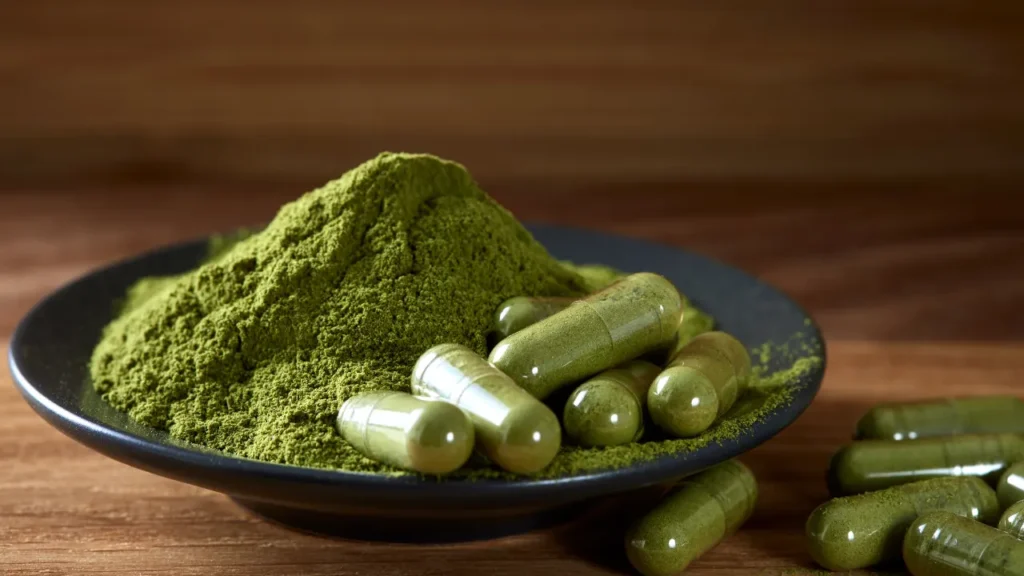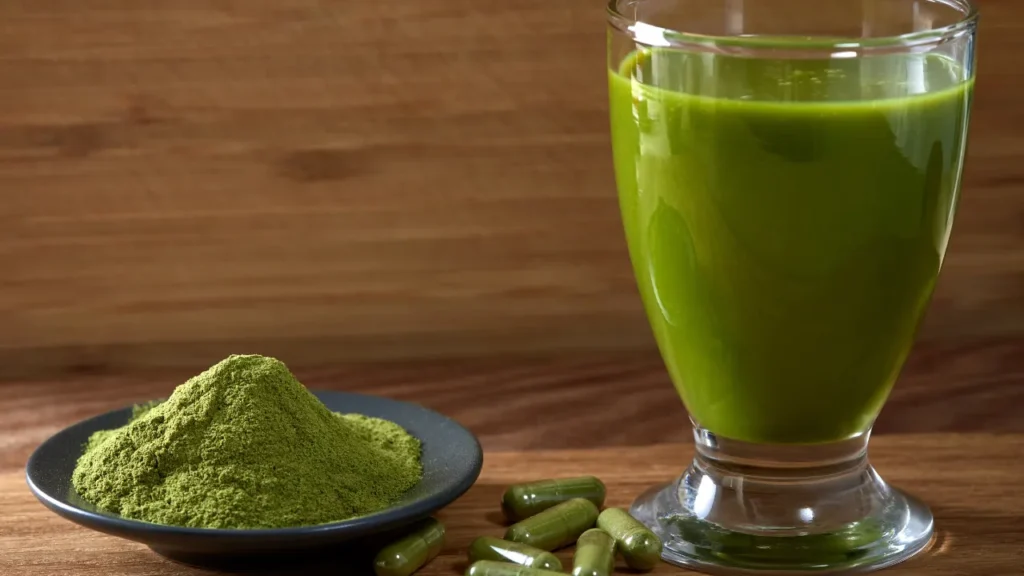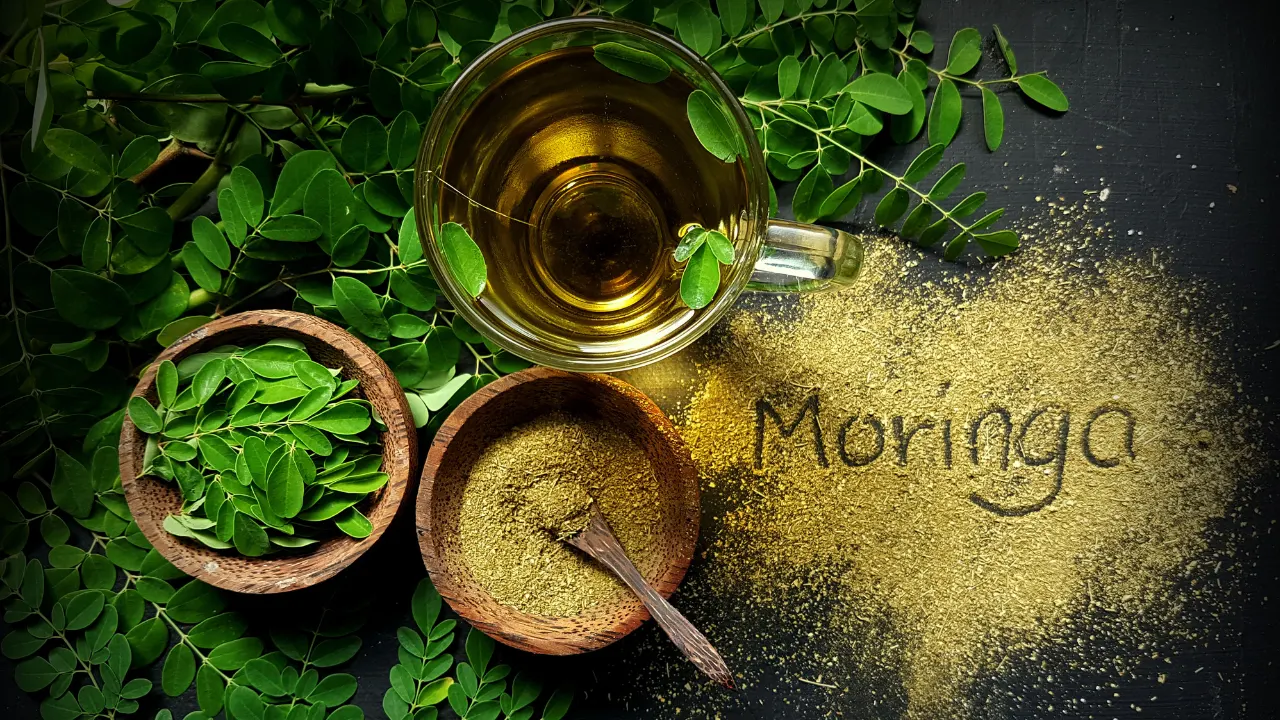Moringa, a plant from parts of Africa and Asia with many possible health advantages, has recently attracted attention. This plant has long been used in traditional African and Asian cultures for a variety of functions, including as an immunity booster, anti-inflammatory, and to promote digestive health and energy levels. Understanding its nature, chemistry, health advantages, ideal dose, potential adverse effects, and potential interactions with other drugs is crucial for ensuring safe administration and for better understanding of its prospective applications. This article aims to provide relevant information to assist readers in making informed choices as to whether to take Moringa as a supplement.
You May Also Like:
Futurebiotics Ashwagandha: A Review of the Facts About This Leading Stress Relief Product
Nature of Moringa
Moringa, also known as the “miracle tree,” has a rich history dating back thousands of years, originating in the foothills of the Himalayas. It spread to tropical and subtropical regions due to its adaptability to diverse climates. The Moringa tree is highly valued for its leaves, pods, seeds, and flowers, all of which are edible and packed with nutrients.
The leaves of the Moringa tree are rich in vitamins, minerals, and antioxidants, making them a valuable dietary supplement, often in the form of Moringa leaf powder. Moringa leaves contain significant amounts of vitamin C, vitamin A, calcium, potassium, and iron. Moringa leaves are also a good source of protein, containing all nine essential amino acids, making them particularly beneficial for vegetarians and vegans.
Moringa seeds, found within the tree’s pods, are also prized for their nutritional content and medicinal properties. They are rich in fatty acids, particularly oleic acid, which is beneficial for heart health. Moringa seeds also contain potent bioactive compounds such as phenolic acids, flavonoids, and glucosinolates, which exhibit antioxidant, anti-inflammatory, and antimicrobial properties. Moringa oil is derived from the seeds of the Moringa tree.
Interestingly, there are a range of Moringa benefits for men. Nutrients like vitamins A, C, and E, as well as minerals like iron and calcium, promote healthy testosterone levels, crucial for male reproductive health and muscle growth. Its anti-inflammatory properties aid in alleviating joint pain and supporting cardiovascular health. With its high antioxidant content, Moringa benefits for men include combating oxidative stress, and potentially reducing the risk of chronic diseases like prostate cancer.

Health Benefits of Moringa
Historically, Moringa has been used to treat various health conditions, and some of these applications have recently gained scientific support.
Anti-Inflammatory Properties: Moringa possesses potent anti-inflammatory properties attributed to its rich content of flavonoids, polyphenols, and isothiocyanates. Backed by scientific research, these compounds help reduce inflammation by inhibiting inflammatory enzymes and pathways, potentially alleviating symptoms of chronic inflammatory conditions such as arthritis, asthma, and inflammatory bowel disease.
Antimicrobial Properties: Compounds like isothiocyanates and flavonoids in Moringa exhibit inhibitory effects against a wide range of bacteria, fungi, and viruses, including antibiotic-resistant strains. Moringa’s antimicrobial activity suggests potential applications in fighting infections and supporting overall health.
Antioxidant Compounds: Scientific research confirms Moringa’s antioxidant prowess, primarily due to its high polyphenol, flavonoid, and vitamin C content. These compounds scavenge harmful free radicals, reducing oxidative stress and inflammation. Regular consumption of Moringa may offer protection against chronic diseases like heart disease, cancer, and neurodegenerative disorders.
Anticancer Properties: One of the most notable ingredients in Moringa seeds is a compound called benzyl isothiocyanate (BITC), which has been studied for its anticancer properties. BITC has shown promise in inhibiting the growth of cancer cells and inducing apoptosis, or programmed cell death, in various types of cancer.
Digestive Health: Often hailed as a superfood, Moringa offers notable benefits for digestive health. Rich in fiber, it promotes regular bowel movements and prevents constipation. Its anti-inflammatory properties soothe digestive discomfort and may alleviate symptoms of conditions like gastritis or colitis. Antioxidants in Moringa may help reduce oxidative stress in the gut. Additionally, studies suggest that Moringa’s antimicrobial properties may combat harmful bacteria in the digestive system, promoting a balanced gut microbiome and a healthier digestive tract.

Chemistry of Moringa
The robust chemical components present in Moringa seeds and leaves play a vital role in the Moringa tree’s bioactive potential. Moringa seeds owe their health benefits to a diverse array of active compounds, including vitamins, minerals, antioxidants, and phytochemicals.
Phytochemicals, natural compounds found in plants, are abundant in Moringa and contribute to its health-promoting properties. One prominent group of phytochemicals in Moringa is flavonoids, known for their antioxidant properties. Flavonoids protect cells from damage caused by free radicals, thereby reducing the risk of chronic diseases such as heart disease and cancer.
Another important group of phytochemicals found in Moringa is glucosinolates, which are sulfur-containing compounds that have been linked to cancer prevention. These compounds have the potential to induce detoxification enzymes and inhibit the growth of cancer cells. Moringa seeds contain benzyl isothiocyanate (BITC), which has shown promising anticancer properties in various studies, including the ability to inhibit tumor growth.
Furthermore, Moringa contains phenolic acids, which have antioxidant and anti-inflammatory properties. These compounds contribute to the overall health benefits of Moringa by helping to reduce inflammation and oxidative stress in the body.
Physiological Mechanisms of Action
- Oxidative Stress Reduction: Moringa is rich in antioxidants like vitamins C and E, beta-carotene, and flavonoids. These compounds neutralize harmful free radicals generated in response to environmental stressors. By scavenging free radicals, Moringa helps prevent oxidative damage to cells, lipids, proteins, and DNA, thereby protecting against chronic diseases.
- Immune Modulation: Compounds such as flavonoids, phenolic acids, and alkaloids found in Moringa have been shown to enhance the activity of immune cells, including macrophages, T cells, and natural killer cells, bolstering the body’s defense against pathogens. Moringa’s immunomodulatory properties also involve regulating cytokine production, promoting a balanced immune response, and reducing inflammation.
- Cholesterol Regulation: Moringa’s high fiber content binds to cholesterol in the intestine, regulating its absorption into the bloodstream. Additionally, bioactive compounds like quercetin and chlorogenic acid inhibit the enzymes involved in cholesterol synthesis, reducing its production in the liver. Moringa also protects against oxidative damage by inhibiting the formation of cholesterol plaques. Studies suggest that Moringa may increase the activity of enzymes responsible for cholesterol breakdown.
- Cancer Prevention: Bioactive compounds like flavonoids, phenolic acids, and glucosinolates in Moringa exhibit anticancer properties. Flavonoids and phenolic acids scavenge free radicals, reducing oxidative stress and DNA damage, while glucosinolates induce detoxifying enzymes, inhibiting carcinogen activation. Additionally, Moringa’s rich content of vitamins, minerals, and antioxidants supports immune function, inhibiting tumor growth and enhancing the death of cancer cells.
- Infection Reduction: Moringa’s rich array of bioactive compounds possess potent antimicrobial abilities, inhibiting the growth and spread of bacteria, viruses, and fungi. Moringa oil has shown efficacy against pathogens like E. coli, skin and soft tissue infections, and fungal yeast infections.
- Energy Booster: Moringa’s nutrient-rich profile helps provide a sustained energy boost by supporting metabolic function and combating fatigue. Its abundance of iron is essential for oxygen transport, while B vitamins are crucial for energy production. Moreover, Moringa’s adaptogenic properties help the body adapt to stressors, promoting overall vitality and stamina.

Optimal Dosage of Moringa
The optimal dosages of Moringa oil and Moringa leaf powder can vary depending on factors such as age, weight, health condition, and individual tolerance. Moringa oil, rich in antioxidants and fatty acids, is commonly used topically for skincare and hair care. A general recommendation for topical use is to apply a small amount to the skin or hair and gently massage.
When it comes to consuming Moringa leaf powder, it’s essential to start with a low dose and gradually increase it to assess tolerance. Moringa leaf powder is packed with nutrients like vitamins, minerals, and proteins, making it a potent dietary supplement. A typical starting dose for adults is about 1 teaspoon or 5 grams per day, mixed into smoothies, juices, or food. However, individual responses may vary; some people may benefit from higher doses, while others may experience adverse side effects.
Consulting with a healthcare professional, nutritionist, or qualified herbalist is advisable to determine the appropriate dosage of Moringa oil or Moringa leaf powder based on individual needs and health goals. Furthermore, it’s essential to source high-quality Moringa products from reputable suppliers to ensure potency and safety.

Side Effects of Moringa
Moringa is generally considered safe to consume, but it can induce side effects if consumed excessively or by certain individuals. Consuming large amounts of Moringa leaves may lead to digestive issues like stomach upset, nausea, or diarrhea due to its high fiber content.
Additionally, some people may experience allergic reactions, including itching, rash, or difficulty breathing, particularly if they are allergic to plants in the same family, such as mustard, ragweed, or broccoli. Moringa seeds contain compounds that can purify water but may also act as a laxative and should be consumed in moderation.
While Moringa offers numerous health benefits, it’s essential to consume it in moderation and be mindful of potential side effects.

Potential Substance Interactions with Moringa
Moringa may interact with medications such as blood thinners, diabetes medications, and drugs metabolized by the liver. Its high vitamin K content could interfere with blood thinners like warfarin, while its blood sugar-lowering effects may enhance the effects of diabetes medications, potentially leading to hypoglycemia. Additionally, Moringa might impact the metabolism of certain drugs by liver enzymes, altering their effectiveness.
Combining Moringa with other herbal supplements may either enhance or inhibit their effects. Because Moringa is rich in antioxidants, it could potentially interact with other antioxidant supplements. While antioxidants are generally beneficial, high doses may lead to adverse effects or interactions with certain medications. Pregnant or breastfeeding individuals should consult healthcare professionals before using Moringa.
Overall, while Moringa offers numerous health benefits, it’s crucial to consult with healthcare providers, especially when combining it with medications or other supplements, to ensure safe consumption.
Best Responsible Uses of Moringa
Using Moringa responsibly requires understanding its potential advantages and disadvantages, consulting with medical experts, following dosage instructions, and monitoring for side effects or any drug interactions.
Having knowledge of Moringa’s potential advantages and disadvantages is crucial for informed decision-making about its use. Consulting medical experts and paying attention to dose instructions ensures safety, prevents adverse effects, and maximizes benefits. Additionally, careful observation of side effects or drug interactions allows for prompt adjustments or cessation if necessary. This comprehensive approach harnesses Moringa’s potential benefits while minimizing risks.
In addition to personal health considerations, Moringa offers a range of responsible uses that address critical global challenges. Firstly, its nutrient-rich leaves are a potent tool in combating malnutrition, especially in impoverished regions. Packed with vitamins, minerals, and protein, Moringa presents a sustainable solution to dietary deficiencies.
Secondly, the Moringa tree’s resilience in diverse climates and its drought-resistant nature make it a crucial player in combating deforestation and soil erosion. Its rapid growth and deep root system make it an excellent candidate for reforestation efforts. Additionally, Moringa’s leaves act as a natural mulch, preventing soil erosion and promoting soil health.
Interestingly, Moringa seeds possess remarkable water purification properties. When crushed and added to water, they can effectively remove impurities and pathogens, offering a low-cost, eco-friendly solution for clean drinking water in underdeveloped areas.
Adopting these responsible uses of Moringa can not only enhance human health and well-being but also contribute to environmental conservation and socioeconomic development.

Moringa: Conclusion
Moringa is a plant that has an extensive history. While its history is long, the body of scientific research on it is scant. Just because its formal body of research is lacking does not mean that it is not an efficacious supplement.
Due to its rich nutritional content, Moringa is consumed in various forms but some of the more common consumption methods include eating the leaves. Moringa leaves can be eaten fresh, cooked, or dried in dishes such as salads, soups, stews, or stir-fries. Moringa leaves can also be brewed as tea, providing a potent nutritional boost. Alternatively, Moringa leaf powder can be added to smoothies, juices, yogurt, or oatmeal, as a convenient way to incorporate Moringa into a diet.
Moringa capsules or tablets, typically made from Moringa leaf powder, provide a concentrated dose of vitamins, minerals, and antioxidants, offering a convenient option for those seeking its health benefits. Additionally, Moringa oil, extracted from seeds, serves various culinary purposes as well as hair and skincare applications.
Whether brewed, sprinkled, or ingested as a supplement, Moringa provides versatile ways to integrate its nutritional properties into daily consumption.
Whether you are looking to boost your immunity, manage your cholesterol levels, improve your digestive health, reduce inflammation and your infection risk, or boost your energy levels, supplementing your diet with Moringa may be an appropriate choice. Be sure to access medical advice before consuming.

References:
- “Moringa oleifera is a Prominent Source of Nutrients with Potential Health Benefits” Retrieved from: https://ncbi.nlm.nih.gov/pmc/articles/PMC8373516
- “Moringa oleifera Extract Enhances Sexual Performance in Stressed Rats” Retrieved from: https://ncbi.nlm.nih.gov/pmc/articles/PMC4357367
- “The Potential of Moringa Oleifera as Immune Booster Against COVID 19” Retrieved from: https://iopscience.iop.org/article/10.1088/1755-1315/807/2/022008
Important Note: The information contained in this article is for general informational purposes only, and should not be construed as health or medical advice, nor is it intended to diagnose, prevent, treat, or cure any disease or health condition. Before embarking on any diet, fitness regimen, or program of nutritional supplementation, it is advisable to consult your healthcare professional in order to determine its safety and probable efficacy in terms of your individual state of health.
Regarding Nutritional Supplements Or Other Non-Prescription Health Products: If any nutritional supplements or other non-prescription health products are mentioned in the foregoing article, any claims or statements made about them have not been evaluated by the U.S. Food and Drug Administration, and such nutritional supplements or other health products are not intended to diagnose, treat, cure, or prevent any disease.

